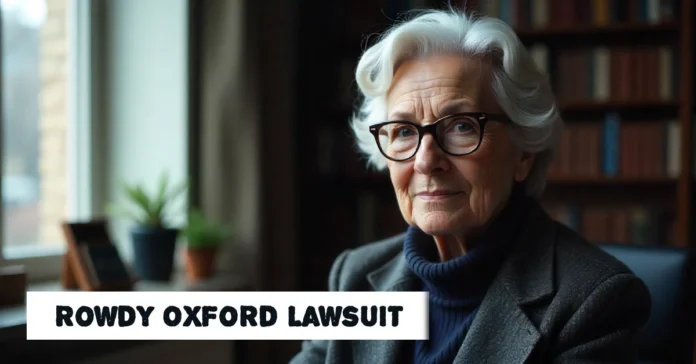The Rowdy Oxford lawsuit involves Integris Composites suing their former VP of Business Development, Rowdy Lane Oxford, for allegedly stealing over 9,000 proprietary files before joining competitor Hesco Armor in 2024. The case concluded with a consent order in January 2025, which required Oxford to destroy all copied data and prohibited him from working with direct competitors for 12 months.
A former defense contractor executive copied thousands of classified files before joining a competitor. That decision triggered one of the most talked-about corporate lawsuits in the defense industry. The Rowdy Oxford lawsuit exposed serious gaps in how companies protect trade secrets—and what happens when trusted employees break the rules.
Who Is Rowdy Oxford, and What Did He Do?
Rowdy Lane Oxford spent over 25 years in the defense industry. He served in the Marine Corps and Army Reserve before climbing the corporate ladder at Integris Composites. As Vice President of Business Development, he had access to sensitive information, including customer lists, armor designs, pricing strategies, and classified government data.
In 2024, Oxford left Integris to join Hesco Armor, a direct competitor. Before his departure, Integris discovered he had copied more than 9,000 files from company systems. These weren’t ordinary documents. They included export-controlled information, Controlled Unclassified Information (CUI), and materials marked “For Official Use Only.”
The company filed suit in federal court in October 2024. Their complaint accused Oxford of breach of contract, trade secret theft, and misappropriation of confidential information. For a defense contractor, this kind of data breach carries enormous risks—not just financial losses, but potential national security concerns.
The Legal Claims Against Oxford
Integris based its lawsuit on the Uniform Trade Secrets Act (UTSA), which protects confidential business information that gives companies a competitive edge. The company argued that Oxford violated its employment contract and fiduciary duties by taking proprietary data.
The allegations included:
- Trade Secret Theft: Oxford allegedly copied customer databases, pricing models, and technical specifications for ballistic armor systems used by military and law enforcement.
- Breach of Contract: His employment agreement prohibited removing company data or working for competitors without permission.
- Misappropriation of CUI: Some files contained government-classified information that Oxford was legally required to safeguard.
Integris sought emergency relief to stop Oxford from using the stolen data. They also wanted him barred from working at Hesco Armor, where he could potentially share their competitive intelligence.
How the Case Was Resolved
The lawsuit moved quickly. By January 2025, both parties had settled a consent final order. Oxford agreed to specific restrictions without admitting guilt or wrongdoing.
The court-approved agreement required Oxford to:
- Destroy or return all proprietary files taken from Integris
- Refrain from employment with Hesco Armor or any direct competitor for 12 months
- Avoid contacting Integris clients, vendors, or government contract holders
- Submit to an independent digital forensic examination to verify data destruction
This type of consent order is common in trade secret cases. It allows defendants to avoid a lengthy trial while giving plaintiffs the protection they need. Oxford’s legal team argued the lawsuit was strategic—an attempt to prevent his career move rather than address actual harm.
But Integris stood firm. They claimed the files Oxford took gave competitors unfair access to years of research, development, and business relationships.
Why This Case Matters for Defense Contractors
The Rowdy Oxford lawsuit highlights unique challenges in the defense sector. Unlike typical corporate espionage cases, this one involved sensitive government information. When employees handle classified or export-controlled data, the stakes multiply.
Defense contractors must follow strict Department of Defense (DOD) protocols. Mishandling sensitive information can trigger criminal investigations, security clearance revocations, and contract suspensions. While Oxford faces civil penalties now, federal authorities could pursue criminal charges if DOD data were compromised.
This case also raises questions about employment mobility in specialized industries. Defense professionals often move between competitors—it’s how the industry operates. But when does competitive intelligence cross the line into theft? The Oxford case demonstrates that courts take data protection seriously, especially when national security interests are at stake.
Companies in this space now face pressure to strengthen their data security systems. Exit interviews, device monitoring, and strict access controls have become standard practice. The message is clear: protecting proprietary information isn’t optional.
What Employees Should Know About Trade Secrets
If you work with confidential information, the Rowdy Oxford lawsuit offers important lessons. Courts recognize that employees have skills and general knowledge from previous jobs. That’s fair game. But taking specific documents, customer lists, or technical data crosses legal boundaries.
Before leaving any employer, understand your obligations. Review your employment contract, non-disclosure agreements, and non-compete clauses. Ask questions about what you can and cannot take. Return all company property—including digital files stored on personal devices.
The consequences of trade secret theft can be severe. Beyond lawsuits, you could face criminal charges under the Economic Espionage Act. Convictions can result in fines up to $5 million and 15 years in prison. Your professional reputation may never recover.
If you’re unsure what qualifies as a trade secret, consult an employment attorney. They can review your situation and guide changing jobs without legal risk.
The Broader Impact on Corporate Security
The Rowdy Oxford case exposes vulnerabilities that many companies share. Once trusted employees have unrestricted access to sensitive data, preventing theft becomes difficult. Organizations must balance security with operational efficiency.
Modern data loss prevention (DLP) systems help by monitoring file transfers, flagging unusual downloads, and restricting external device access. Some companies implement “zero trust” security models that verify every access request, regardless of user position.
But technology alone won’t solve the problem. Companies need clear policies about data handling, regular security training, and a culture that values confidentiality. Exit procedures should include forensic checks of devices and cloud storage accounts.
For businesses handling government contracts, compliance requirements add another layer. The Cybersecurity Maturity Model Certification (CMMC) now requires defense contractors to prove they protect sensitive information. Failing to meet these standards can disqualify companies from bidding on contracts.
What Happens Next for Oxford and Integris
The consent order settles the civil lawsuit, but questions remain. Oxford cannot work for Hesco Armor or similar competitors until early 2026. After that, his options depend on whether the 12-month restriction satisfies his contractual obligations.
Integris, meanwhile, must assess the damage. Did competitors gain access to their trade secrets? Have they lost business because of the breach? These answers will shape their next moves—potentially including additional lawsuits or criminal referrals.
The case also serves as a cautionary tale for other executives in the defense industry. Companies are watching closely, and they’re taking steps to prevent similar incidents. Expect tighter security protocols, more aggressive legal action, and increased scrutiny of job transitions.
FAQs
What files did Rowdy Oxford allegedly steal from Integris Composites?
Oxford allegedly copied over 9,000 files, including proprietary customer data, ballistic armor designs, pricing information, and export-controlled government documents. These files contained trade secrets and classified information that gave Integris a competitive advantage in the defense contracting market.
Did Rowdy Oxford face criminal charges for the alleged data theft?
No criminal charges have been filed as of October 2025. The case was resolved through a civil consent order in January 2025. However, if Department of Defense investigators determine that classified information was compromised, Oxford could potentially face federal criminal prosecution under the Economic Espionage Act.
How can companies prevent employees from stealing trade secrets when they leave?
Companies should implement exit procedures that include device audits, access revocation, clear data return policies, and forensic checks of cloud storage. Data loss prevention systems, employee training, and robust non-disclosure agreements also help protect sensitive information. Regular security awareness training reminds employees of their legal obligations.





